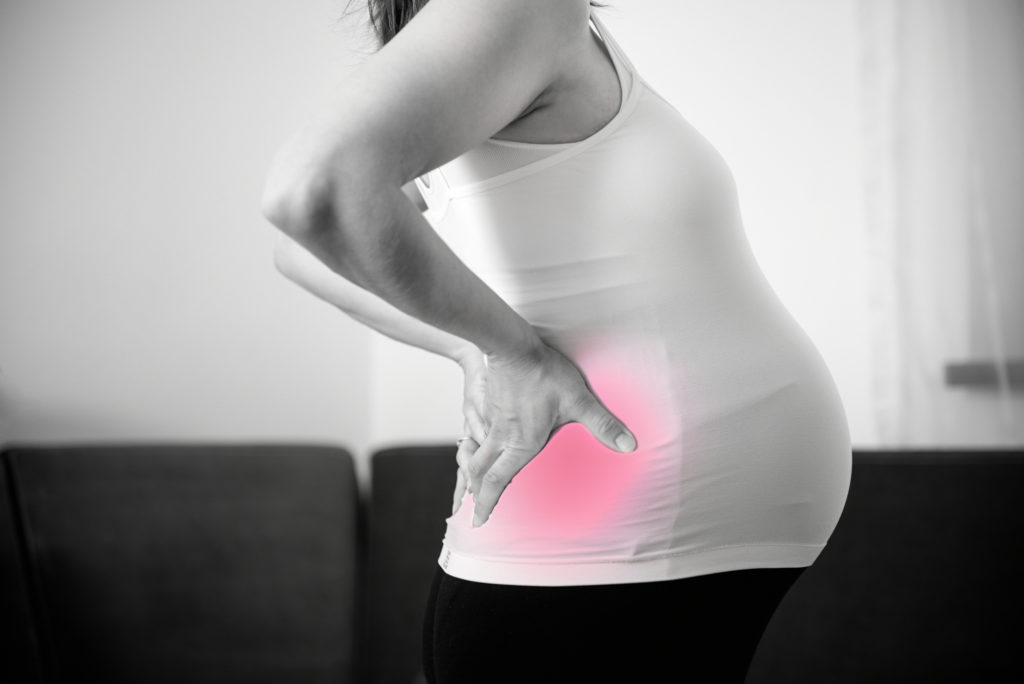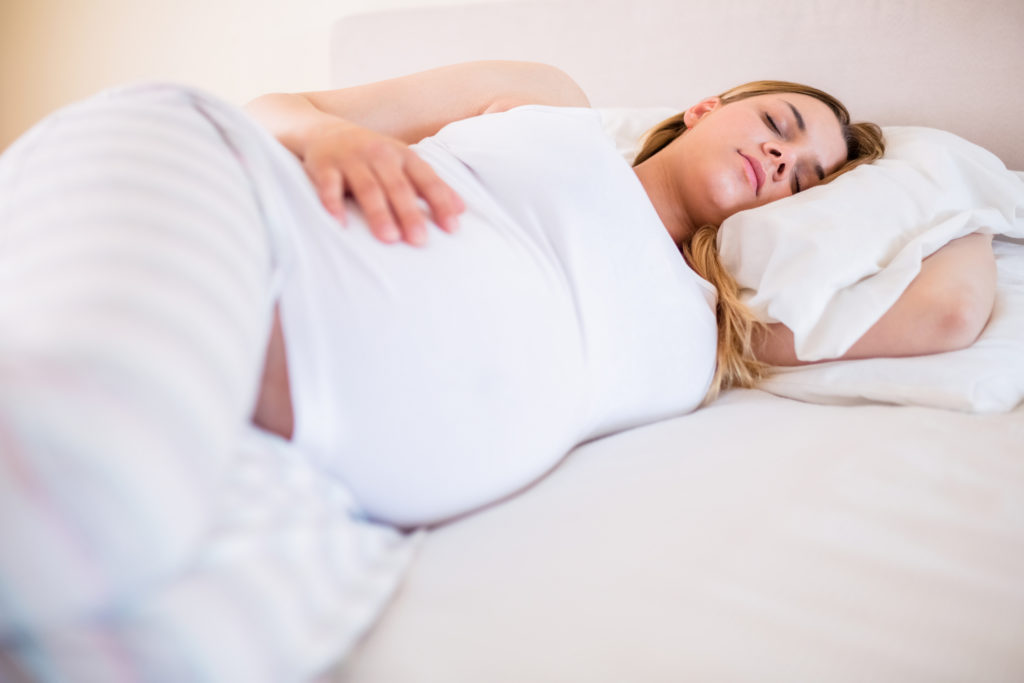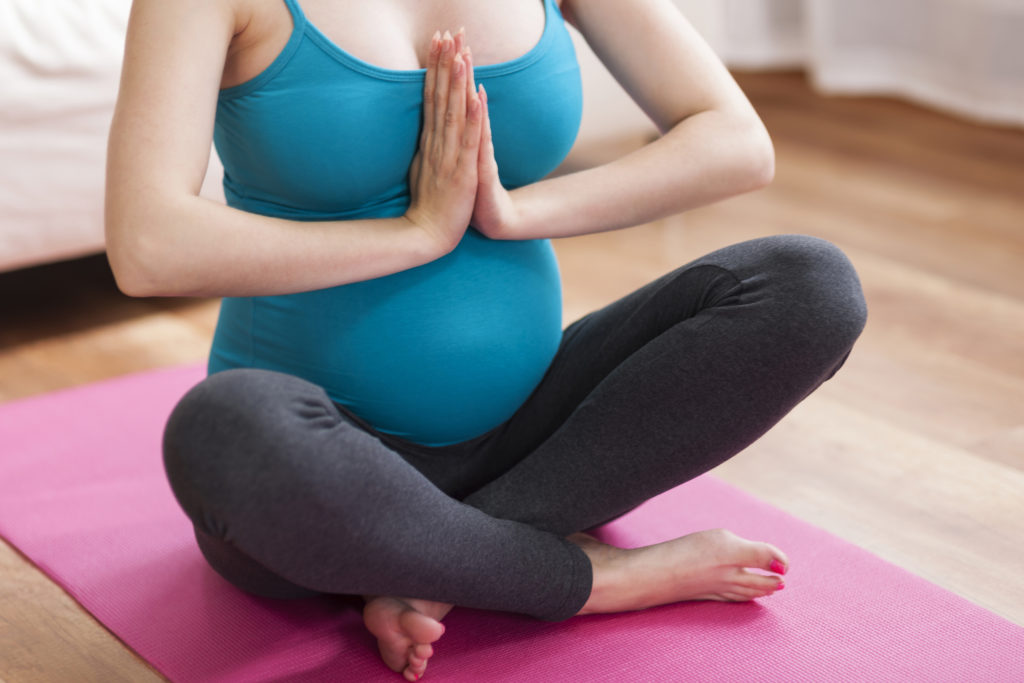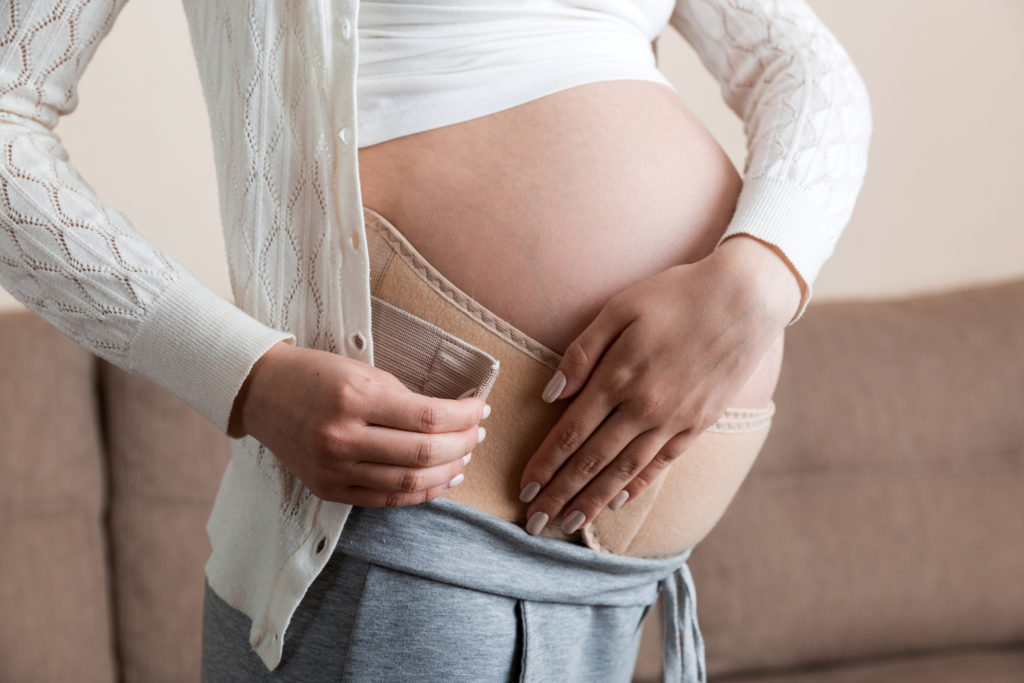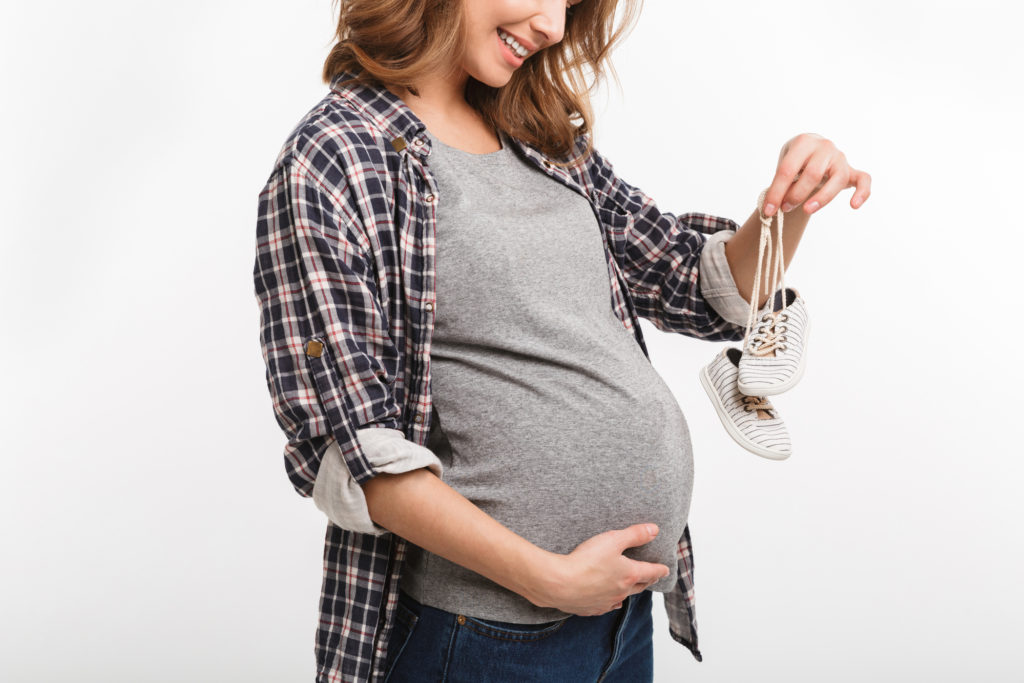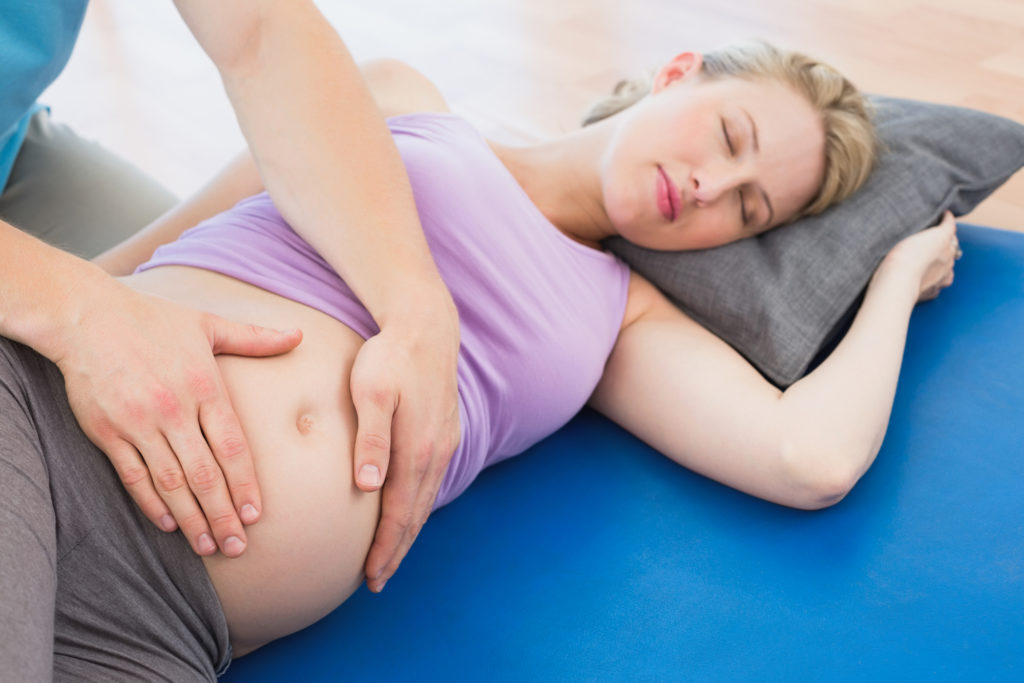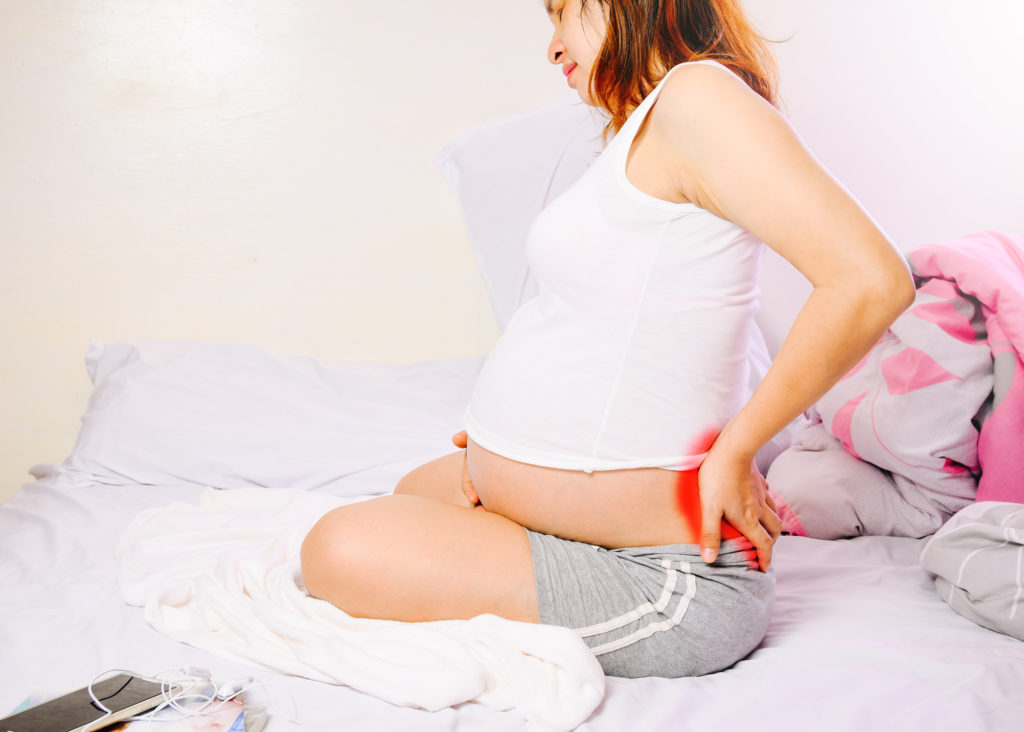
Is back pain keeping you awake at night and preventing you from “blooming” and fully enjoying your pregnancy?
You’re not alone. It’s a common complaint, sadly.
For most women, back pain occurs in the middle of their pregnancy – between the five- and seven-months mark. It tends to happen most commonly at this point because the uterus changes its position from the pelvic area to the abdomen, which increases stress on the mid and lower back area.
Consequently, as your bump goes through this change and pushes upwards into your belly, it alters the spine’s normal position, and the rising pressure pushes the vertebrae in the back, leading to pain that seems to haunt you right when you want to get to sleep. Tossing and turning for hours until the birds start to sing again. The good news is that there are many ways to relieve or even prevent pain and build a stronger back, even while pregnant. So, you don’t have to endure it and grimace through your pregnancy.
We can help you get good restful sleep and help you avoid walking around holding your back and staying home, laid up in front of the TV for the next few months. Instead, you can get out there and thrive, continue to exercise, and enjoy every moment of this precious time carrying your baby, without feeling the crushing fatigue that comes with not sleeping properly.
More Articles From Apex
Why Preparing For Your Journey Can Help Prevent Back Pain
Getting To The Route Of The Problem Of Tennis Elbow
What are the risks of anti-inflammatory use?
How To Treat Pregnancy Back Pain
- Visit an Osteopath: One of the most effective ways to deal with back pain – especially in the early stages of pregnancy, is Osteopathic treatment. We help Mums-to-be to correct the postural problems that contribute to back pain. We also teach you a range of exercises you can practice at home to prevent back pain during your pregnancy. But aside from that. We also use techniques unique to osteopathic treatment to manipulate your muscles and joints. These techniques alleviate the pressure and stress building up on your spinal column and nerves, which is the leading cause of pregnancy back pain and sleepless nights.
For example, we guide you on how to sit, lie, sleep, stand, and walk while pregnant without applying negative pressure on your back muscles. Our Osteopaths also walk you through a range of stretching movements to make your joints more supple.
What Else Can I Do To Get My Sleep Back?
But what else can you do to treat and prevent pregnancy back pain to help make this special time in your life more enjoyable (and less of a “strain”)?
- Get a good night’s rest: Yep. Sounds good on paper, right? However, we know that getting a good night’s rest while pregnant can be challenging. One of the main reasons for this, which is more pronounced in women who sleep on their sides, is the extra weight placed on the spinal cord when you try to sleep, which can be painful and uncomfortable. One way to overcome this issue is to place a folded, thick towel lengthwise at a right angle to your waist. This extra support relieves the strain on your back and pelvic region. Or an alternative to this is to place a pillow between your knees when lying on your side to decrease the pressure on your back and pelvic area. NB. When pregnant, you should avoid sleeping on your back because it is not helpful for you or your baby. In the latter stages of your pregnancy – in the third trimester- sleeping on your back can reduce your baby’s blood and oxygen flow. Instead of sleeping on your back, choose a firm support mattress and use pillows as props to sleep either on your left or right side. Introducing a “sleep routine” that works for you can help, too, as can eating at least 2-3 hours before you attempt to sleep to prevent digestive discomfort that might keep you awake and stop you from getting restful sleep.
- Consider opting for a prenatal Yoga or Pilates class: Yoga and Pilates are not only popular with pregnant celebrities and movie stars. They also have a legion of ardent followers and practitioners from all spheres of life. For a good reason, too – because they’re great forms of exercise for staying fit and healthy during pregnancy. They also prepare your body for childbirth and labour and prevent pregnancy-related aches and pains.
- Prenatal yoga: This form of yoga helps the nerves, muscles, ligaments, and joints that help improve your posture and strengthen your body during pregnancy – with “asanas” chosen especially (and considered safe) for pregnant women. Prenatal yoga also benefits your mind and mental health by relieving stress through deep breathing techniques that relax the body and mind and help you enjoy a more comfortable, restful sleep. It also calms the nervous system and helps to reduce some of the natural anxieties that sometimes accompany pregnancy.
- Prenatal Pilates: Like prenatal yoga, Prenatal Pilates is a gentle pregnancy-suitable form of exercise that uses a sequence of moves to improve balance and strengthen the “core”. However, there are subtle differences between the two disciplines. Whereas yoga is a bit more free-flowing. Pilates is a more regimented and arguably more effective method for strengthening and elongating muscles and preventing pregnancy back pain.
- Use a maternity belt: Maternity belts are proven effective in relieving pain in pregnant women. If you’re in the final stages of your pregnancy and feeling too worn out and uncomfortable for prenatal yoga or Pilates. One of the easiest ways to relieve and support your back when pregnant is to use a maternity belt. Maternity belts support your belly while walking, standing, and moving around. So you can relieve the strain on your lower back and pelvic area that can contribute to back pain. How does it work? Well, in the latter stages of pregnancy, the belly protrudes forward. This change affects the normal weight distribution of your body. It causes stress on your spinal cord, especially in the lower back area. Wearing a maternity belt helps compensate for the weaker core muscles that develop during pregnancy and prevents excessive spinal cord curvature.
- Take up meditation: Another effective way to destress and relax and help prevent pregnancy back pain is through meditation. There is no need for professional guidance. Plenty of DIY tips are available online, including YouTube videos and downloadable apps that guide you on how to do it effectively. While meditating, the focus is to adopt mindful breathing and emphasize inhalation and exhalation, which signals your nervous system to relax. The best thing about meditation is that you can practice it at any time of the day or evening, so you don’t need to make time to attend a class (although you can if you want to). In addition, stress levels reduce a lot when we meditate. During pregnancy, this relaxation and reduction in stress are especially beneficial because it alleviates muscular tension and regulates blood pressure. Regular meditation can also increase your pain tolerance and offer many other mental and physical benefits. Again, many of these benefits are helpful during pregnancy, especially in preventing back pain.
- Choose the proper footwear: While it’s tempting to want to stay at the forefront of fashion and style during pregnancy, and it’s still possible, unsurprisingly, wearing high heels and stilettos during pregnancy will not help your back. High-heeled shoes and boots increase the curvature of the spine and place pressure on the back, which leads to pain. Plus, there is also a risk when wearing high heels during pregnancy that you could increase your chances of having a fall. This increased risk is due to the change in your centre of gravity, which can lead to losing your balance and falling. While it’s sensible to avoid super high heels and stilettos, we also don’t recommend that you wear entirely flat shoes for the duration of your pregnancy. Why? Flat shoes provide very little support in the arch area of the foot and uneven distribution of body weight, which can cause strain on the lower back. Instead, look for footwear with built-in stability for the foot arch and ankles – with heels that are not too high but not too flat. They need to be “Just right”. If they feel uncomfortable or you feel additional pressure in your lower back when you wear them, then they’re probably not sure for you, and it’s not worth the risk to wear them in the name of fashion when it may result in back pain or foot and ankle problems.
- Consider a prenatal massage: If you suffer back pain during pregnancy, prenatal massages can help relax your muscles and provide temporary pain relief. Make sure you use a professional and certified massage therapist who uses essential oils and massage oils that are suitable during pregnancy and has experience in prenatal massage. In addition, prenatal massages are a great way to reduce stress and anxiety. Still, if you have back pain during pregnancy, we recommend you book an appointment with an osteopath to help you find and treat the root cause and prevent problems further down the line in your pregnancy and beyond. We offer all new patients a free consultation with one of our prenatal specialists. Book yours now.
How Can We Help You?
Not being able to sleep due to back pain can really take the shine away from your pregnancy.
Get in touch today and we’ll work with you to reclaim your peaceful night’s sleep.


